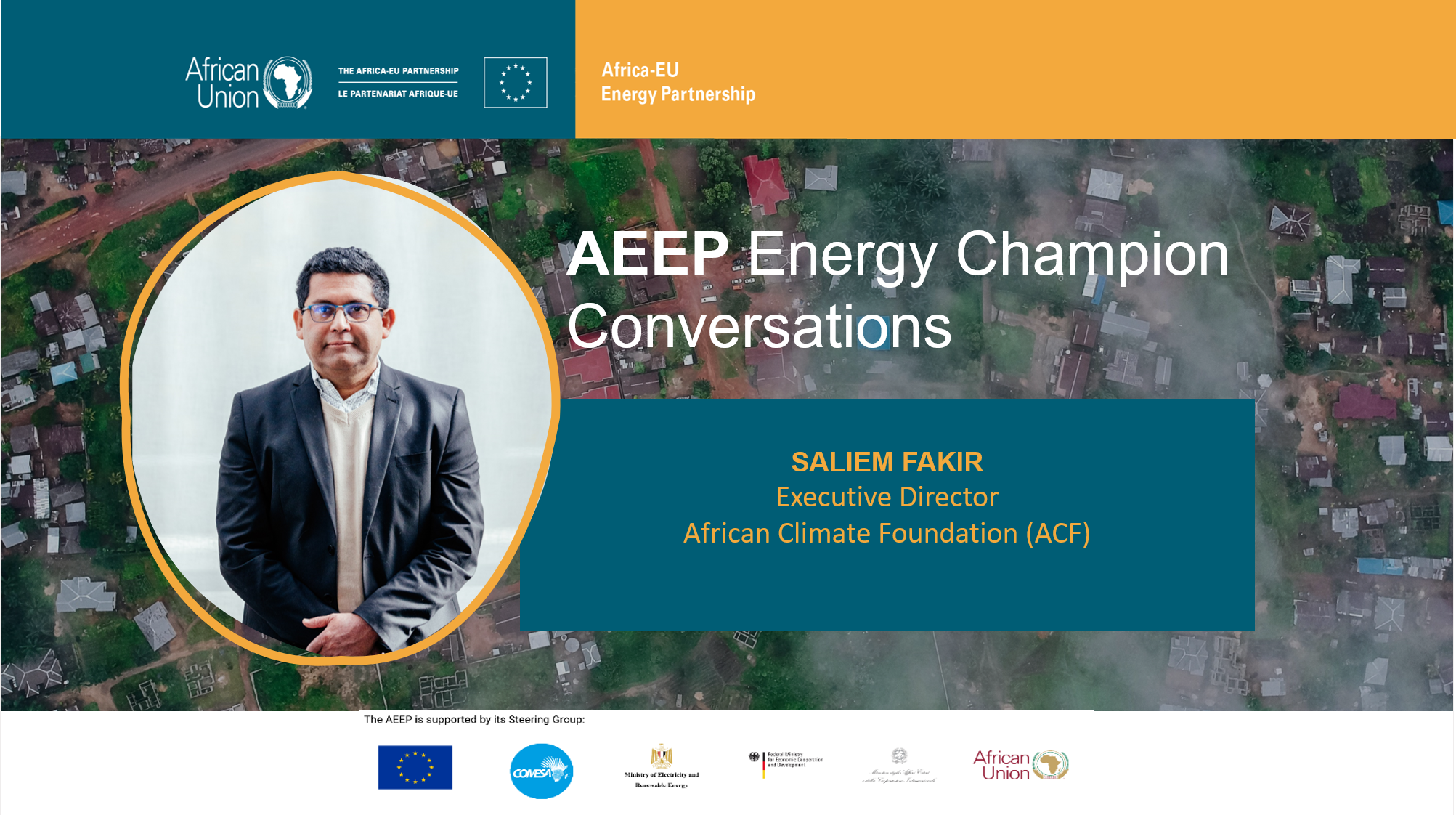AEEP Energy Champion Conversations: Saliem Fakir

The AEEP Energy Champion Conversations is a series of interviews that highlight the work of inspirational energy experts in Africa and Europe. We meet passionate promoters of a sustainable energy transition and hear their insights on the biggest achievements so far and most pressing challenges ahead.
Universal access to clean, appropriate and affordable energy is a prerequisite for well-being and economic development as envisioned by the UN 2030 Agenda for Sustainable Development, the UN Paris Agreement on Climate Change, the African Union’s Agenda 2063 and the EU’s Comprehensive Strategy with Africa.
As the gateway for joint action on a green energy future, the Africa-EU Energy Partnership (AEEP), in this series accentuates visions of key energy actors on how to achieve universal access to affordable, sustainable and modern energy services in Africa.
SALIEM FAKIR, Executive Director, African Climate Foundation
1. When, how and why did you start to work for a sustainable energy future?
I’ve been interested in sustainability issues post-university. I was more involved in the field of biotechnology, but then joined a think tank called the Land and Agriculture Policy Centre in the early 1990s. One of the issues I dealt with was natural resource management and I became very interested in the field as it was quite multidisciplinary and I enjoyed the challenge of having to deal with complex issues. Later in life, from 2007 onwards, I worked a lot more in the energy sector and took a big interest in renewable energy, policy and finance. Subsequently, I have focused on the relation between climate, energy transitions and economic transformation.
2. Tell us about some of the most successful steps that you have been involved in so far to achieve sustainable, affordable and modern energy for all in Africa?
It is hard to claim success on your own because there are so many people involved. I think for me the most important piece of work was on the South African Renewables Initiative (SARI), around ten years ago. It was pioneering in the sense that it was one of the first initiatives that looked at the use of globally available climate finance to fast track and scale up renewables in South Africa. Although the programme did not go in the form it was originally designed, it had a massive influence on the South African renewable IPP programme. I was also very active at the Sustainability Institute in Stellenbosch and the Centre for Renewable and Sustainable Energy Studies in the design of a new course on renewables and finance. It tried to get engineering and non-engineering students to think about clean energy technology, socio-economic benefits and localisation.
Now, I am working on a massive initiative, which is the establishment of a new climate foundation on the continent. One key, large-scale initiative is to look at rapid coal phase-out, Eskom’s debt and the separation of the transmission system from generation. The goal is to support Eskom and the South African government to see if it can benefit from special coal phase-out transition finance. As a new foundation, we are very proud to be part of the process and the fact that we have grantees that are doing excellent technical work to support Eskom and others on just transition issues. The work of some of the grantees, particularly Meridian Economics, has also had a massive impact on the embedded generation threshold policy debate and reforms. Originally set at 1 MW, without requirements for a license, President Ramaphosa just announced that the state should allow 100 MW as the embedded generation cap limit without the need for a license. This is not only due to lobbying by businesses but also due to the technical work by the grantees. Our foundation is looking to replicate a lot of this work elsewhere on the continent, for example, supporting large-scale renewables roll-out.
3. Africa and Europe have an established and dedicated partnership on energy. What do you see as the particular strength of this partnership? If we had an initiative to intensify and accelerate that partnership’s impact, what would be your aspirations for such a framework?
Africa-Europe relationships are very important. Europe is the most proximate continent and very tied, both in the past and in the future, to the African continent. The relationship is vital from a diplomatic and political point of view. In terms of the official negotiations, the Africa-Europe partnership still must go a long way to resolve important matters by which the two continents can cooperate. One of the big areas is of course around the energy sector and the need for energy access on cheap and affordable basis. The European relationship is essential in terms of technology availability, but also in terms of financing, and the ability of European firms to have the capacity and technical capability to ‘crack’ the problem of energy accessibility and affordability in Africa. It also depends on the ability of the African continent to take advantage of these new technologies that are more versatile for distributed forms of generation. We don’t have to build vast infrastructure. We can work closely with Europe to find technical and financial solutions to scale the new energy revolution that the continent needs. But Europe must engage Africa in a sensitive and strategic manner and not pursue its own self-interest at the cost of Africa’s long-term development. Europe should also work with Africans to look at post-gas dependency transitions.
4. How do we ensure that the shift away from fossil fuels to sustainable energy solutions happens in a just way that includes even the most marginalised groups in society?
I think this is the most important issue on the continent. One way to look at this is to link energy transitions to economic transformation. There is an opportunity to think about African economies very differently. Many African economies are highly commodity dependent and driven and have not built a wider productive base that is essential for job creation and more beneficial economic activity, and that can raise the income of the populous. For that to happen you do need a stronger availability of electricity. This is the challenge; you’ve got the need for electricity, but you need the income and demand to be able to drive that. This is why economic transformation is important and cheap electrification is a critical element of this economic transformation agenda.
In South Africa the story is a bit different, there is high inequality and the economic pie needs to be more inclusive. South Africa has to decarbonise and if it does, it will lose jobs in the coal sector. But, it is better not to wait and allow a more disruptive and destructive process to define the manner of coal phase-out, instead the process can be managed and just. We have to find ways to replace coal with clean energy and those cleaner energies will have to substitute the losses of jobs in the coal sector. Then, more energy means more economic activity and hopefully, there, the lack of constrain of supply of electricity leading to load shedding, can lead to better and more sustainable long-term economic growth. The different elements of the debate need to be brought together. There is no doubt that if we talk about energy transitions in South Africa or elsewhere on the continent, the notion of a just transition must be an important element of that policy change.
5. What motivates you to keep pushing for a clean energy transition?
Many years ago, this seemed an impossible ideal. Today, it’s become a more real ideal. I am part of a career now where it is possible to make it happen. The future looks nearer than it used to, and you don’t want to not be part of that. Essentially, those who are involved in this sector are effectively evolving a new kind of civilisation, we are making history, all of us are. The fact that that future needs a little bit more pushing to come forward faster, that excites me and makes me wake up every morning dreaming up new ideas of how to solve the problems. I don’t suggest that I alone can do that, we have to work as a collective.
Saliem Fakir is the Executive Director of the African Climate Foundation (ACF). He holds a Masters’ Degree in Environmental Science and Management from Wye College London, UK. Mr Fakir has worked in the fields of environment, climate, finance economics and with a wide range of development issues. He has served as the Head of the Policy & Futures Unit of WWF South Africa and as Associate Director for the Centre for Renewable and Sustainable Energy at Stellenbosch University.
The ACF is the first African led strategic climate change grant-making foundation in Africa. The foundation aims to support Africa’s efforts to address climate change. ACF provides a mechanism through which philanthropies can contribute to supporting African solutions to the climate change challenges the continent faces.
Read the interview with Safiatou Alzouma Nouhou.





